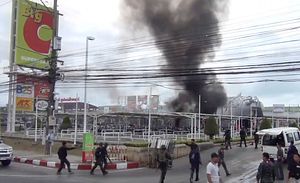Last week, in a historic development in the long-running southern Thailand insurgency, rebels announced a new, full, humanitarian ceasefire amid the global coronavirus pandemic. While the ceasefire constitutes a notable and encouraging event, how it will actually impact the dynamics of one of Asia’s deadliest conflicts remain unclear.
Despite the rise of a new wave of violence in Thailand’s Malay-Muslim majority southernmost provinces since 2004 that has left over 7,000 dead in what is one of Asia’s deadliest ongoing conflicts, multiple rounds of talks between the government and insurgents, at times with facilitation of neighboring Malaysia, have been held to no avail. Though there have been some encouraging signs in 2020 including the launch of a new phase of direct peace talks, as with other insurgencies in Southeast Asia, a key looming question has been how the global coronavirus pandemic might affect the insurgency.
Last week, this question was in the spotlight with the declaration of a ceasefire by the National Revolutionary Front (BRN), the most powerful of the rebel groups in southern Thailand. The BRN declared a ceasefire on humanitarian grounds, noting that there were concerns about the ongoing global coronavirus pandemic that had also affected the people of southern Thailand.
Per a statement issued Friday that was attributed to BRN’s Central Secretariat, BRN said it was halting “all activities” with immediate effect to create a more “comfortable and peaceful environment for the Patani people” including the work of health workers and efforts by other agencies to control COVID-19, which it referred to as the “main enemy for all humankind.”
The development is not without significance. While talk of geographically and operationally limited cessation of hostilities or attacks has long been a feature of the southern Thailand insurgency, this represents the first known complete ceasefire on humanitarian grounds of its kind declared by the BRN within the southern Thailand insurgency since the new wave of the insurgency erupted back in 2004.
It also spotlights the growing attention even by rebels and insurgents of the humanitarian consequences of COVID-19 and how it affects peace and conflict dynamics. Thailand now has over 2,000 coronavirus cases, with over 100 of those reported in southern Thailand thus far. BRN’s statement specifically noted, in line with previous statements, that infections and deaths could be expected to rise “if no health-related measures are taken by the Patani people” and also accused Thai forces of making life even more difficult for southern Thailand’s people by persisting with restrictions and operations during a pandemic.
But while this may be a notable and encouraging development, doubts about the sustainability of the ceasefire are likely to remain. The most immediate concern is the change that events and developments may quickly lead to violations that then render the ceasefire no longer operative. The shadowy nature of the insurgency has always made it more susceptible so such a dynamic. The Thai military has suggested that its posture in southern Thailand will remain unchanged in spite of the ceasefire, and, already, police reported that just a day after the cessation of BRN activities, gunmen shot and wounded an elderly man in Pattani province.
Beyond that, it is unclear whether any ceasefire will be able to be translated into broader inroads that can actually resolve the underlying issues in the southern Thailand insurgency, including the difficulty for the Thai government satisfy insurgency demands like devolution or autonomy or the challenge of preserving incremental gains in the fact of spoilers on both sides.
To be sure, this should not detract from the ceasefire as a notable development in both alleviating the violence affecting the people of southern Thailand as well as providing an avenue for both sides to make further progress. But it does mean that given the previous developments we have seen in the southern Thailand insurgency, the key question remains how this ceasefire will actually affect the longstanding dynamics of peace and conflict on this issue.

































